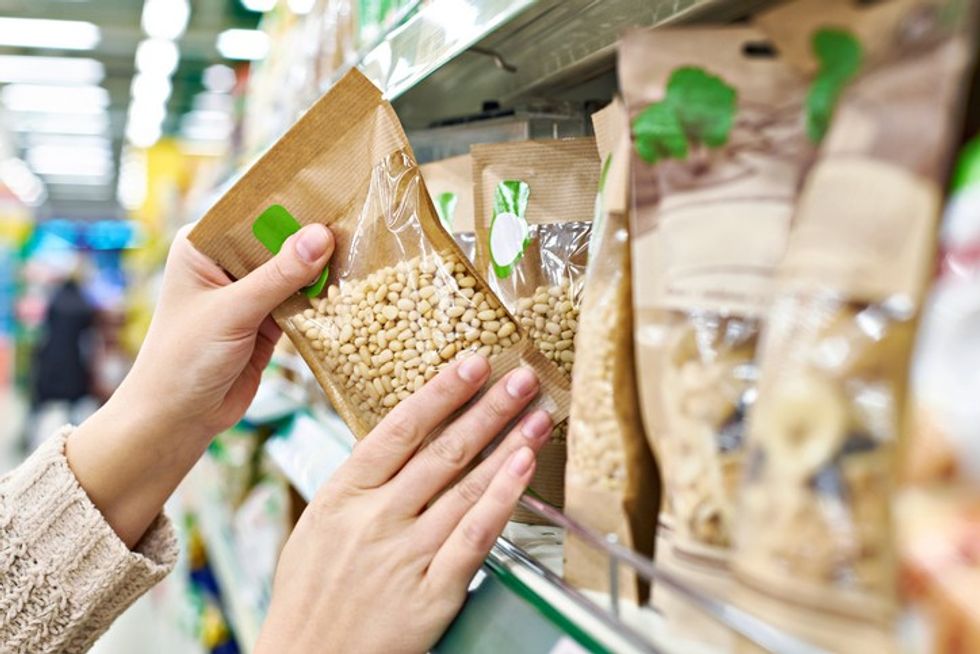After being huddled away on dusty bottom shelves for years, own label line of products is currently having their time in sun, thanks to their better value proportion amid tough times.
Products of own label, also known as private label, are usually made by third party but sold under a retailer's own brand. It is no secret that soaring inflation, particularly since the start of the war in Ukraine, has made grocery shoppers more price-conscious. They are adjusting their spending habits, seeking more affordable products and looking out more for promotions and discounts.
Own label products are usually cheaper and tend to offer similar quality and quantity, hence a considerable better value proportion. Prime reason here is the stark price difference, often ranging from twice to thrice the price gap when it comes to kitchen staples like dry pasta.
Sales of these cheaper line of products has been rising post-pandemic, matching steps with rising inflation. In January when grocery prices were up a record 16.7 per cent from the same point last year, sales of own-label products saw a rise of 47 per cent in the same period of time, Kantar stated in its monthly report.
People have been turning to more own-label products, and away from brands, "with sales of these [own-label] lines growing consistently over the past nine months," Kantar analyst Fraser McKevitt said at the time.
Similar trends were seen in February as well. As grocery price inflation rose again to reach 17.1 per cent -(the highest level ever recorded by Kantar), sales of own label went up by 13.2 per cent, well ahead of branded products which saw a rise of 4.6 per cent, a trend that shows little sign of stopping.
“Own label ranges have been one obvious focus and shoppers have consistently bought them over brands since February last year,” McKevitt said at the time of the release of February’s report.
Kenton Burchell, Trading Director at Bestway Wholesale, agrees with market trends.
“With the cost-of-living crisis, the market share for own label is increasing with own brand labels symbolising a budget friendly primary basket spend for consumers,” he said.
Rise in popularity of such products is now putting a dent in bigwigs' profits. Like Colgate recently declared that it saw organic volumes fall 4.5 per cent as consumers switched to cheaper and stores’ own label products.
What’s on cards?
Most suppliers and symbol groups today offer a wide range of own-label products across different categories such as fresh produce, bakery items, frozen foods, meat and poultry, dairy, and household essentials.
Bestway Wholesale’s Buddies one of such own label products that independents can chose to have in stock.
“At Bestway we have the Buddies price marked range,” Burchell said.
“For Best-one labels, there are over 400 products across all categories that retailers can have in stock. These include soft drinks, alcohol, confectionery, household, baby care and frozen categories. Canned goods such as tuna, oil, and canned meats are main staples.
“Best-one own label under the premium range uses the finest ingredients with products such as crisps and cookies which are great for sharing and appealing to consumers,” he told Asian Trader.
In fact, in January, Bestway Wholesale scooped five awards at the CCM’ Own Brand Awards, which are run in association with, and judged by, the Craft Guild of Chefs. The wholesaler Bestway was announced as the winner Nut Spreads Category, Preserves Category, Pickles Category, Soft Drinks Category and Confectionery.

“Increasingly, consumers are turning to own-label within the cost-of-living crisis. I can report that we have seen an increase of nine per cent YOY in volume on own label products specifically on core cupboard essentials,” Dawood Pervez, Managing Director at Bestway Wholesale, said at the time.
Co-op's own label lines include Irresistible - premium own-label range, which includes a variety of high-quality food items such as cured meats, artisan bread, and specialty cheeses, Loved by Us - everyday food items such as breakfast cereals, pasta sauces, and frozen meals, Free From and Co-op Honest Value - budget own-label range offering canned goods, rice, and pasta.
To make best of this wave, Nisa has recently announced an investment of £5 million into the Co-op own brand range pricing, under which the symbol group reduced the prices of over 1000 SKUs for independent retailers and ensured retailers have access to the Co-op range.
“We are realizing that customers are going into our own brands across the whole. And that’s why, listening to the feedback, we have chosen the 2000 own brand products to make our multi-million investment in,” Nisa’s newly appointed Managing Director, Peter Batt, told Asian Trader at the time of launch in November.
Wholesale giant Booker also has a complete range of products to offer to indies. Its most popular own brand line, Euro Shopper is an exclusive line that features over 100 price marked SKUs, covering all the top selling categories including soft drinks, milk, fresh, biscuits and paper.
Booker’s Euro Shopper comes with a guaranteed minimum 30 per cent POR on all products, some products up to 45 per cent. Euro Shopper’s top selling products include its energy drinks, orange juice, toilet tissue, mild white cheese and Jaffa cakes.
Apart from Euro Shopper, Booker also offers a wide range of exclusive beer, wine, spirits and cider brands. This range also includes price marked packs of beer, cider, spirits and wine.
Another hugely successful own label line by Booker is Tuck Shop Confectionery- comprising of over 100 confectionery lines all boasting natural colours. To complement the Tuck Shop confectionery range there is also a range of Sugar Free 330ml Tuck Shop carbonates in a ready to drink bottle format.
Londis also offers its retailer members Euro Shopper’s is a range of over 90 great value everyday family favourites. Soon to be launching Jack’s label- an exclusive range from Tesco- will comprise of 100 lines across grocery, meat, fish and bakery.

Symbol group Costcutter work with the Co-op as our wholesale supplier to offer an exceptional range with over 14,000 lines with a blended margin of 30 per cent.
Wholesaler Parfett also offers its own-label product range including a variety of food and non-food items, including fresh produce, chilled and frozen foods, snacks, beverages, household essentials, and pet food. Go Local range is Parfett's premium own-label range that has almost 150 lines across a wide selection of key categories, delivering up to 57 per cent POR and very competitive RRPs.
In October last year, SPAR launched convenience chain’s ‘Spotlight’ range including over 100 of its own-brand lines ranging from fresh, frozen, grocery, impulse, as well as beer, wine and spirits.
In fact, SPAR last year became the first grocer to have a 100 per cent vegan friendly Own Label wine range. This year, it has expanded its range of own-label sweets with the launch of five new lines, including Giant Strawberries, which are vegan and vegetarian-friendly. The Spar own-label lines are said to be selling particularly well, as are products like Fruit Pastilles, which went vegan a few years ago.
Cotswold Fayre Selections is a premium own-label range by wholesaler Cotswold Fayre that includes a variety of artisanal food and drink items, sourced from small-scale producers in the UK and overseas. The range includes products such as sauces, condiments, preserves, chocolates, and sweets, as well as a range of alcoholic and non-alcoholic beverages.
Cotswold Fayre Selections is aimed at independent retailers and caterers who are looking for premium quality, artisanal products to offer their customers. The range is designed to provide retailers with a point of differentiation and help them stand out in a competitive market.
What is happening?
Consumers are increasingly switching from known to private brands (particularly for staple items such as canned vegetables, cheese and baby products), so retailers must take care to create quality and value here as well as sustained availability.
They must ensure own label items are on the shelves. The good thing here is that retailers tend to have a closer relationship with the supply chain so a better control over data and stock.
As shoppers’ budget got increasingly squeezed over the past year, they were left to stretch their money further anyhow- be it promotions, skipping non-necessary premium products and opting for cheaper essentials.
“With the rising prices continuing to affect the fuel and food cost, consumers are making smart choices and to ensure that their choices of purchases fit their budget,” Burchell from Bestway Wholesale told Asian Trader.
“The price marked packs for the own label products gives an impression of good value for money for consumers.
“Independents should expand their stock and product choice by speaking with their business development team to get specific advice on product availability for the store,” he said, suggesting offering “product tasting” of new own brand products to attract customers.
Apart from money saving benefits, consumers are also switching brands due to lack of availability of some branded products, due to some retailers having problems in the supply chain, stated Burchell.
Burchell also pointed out that categories should be merchandised based on the staple grocery spend of shoppers.
“They need to stand out and so be placed in one main location that is convenient for shoppers to peruse the products. Mix category of own label and branded products so customers have a choice of mixing their product choice by quality, price and brand,” he said.
Interestingly, the rise of own label line of products is not temporary or seasonal as industry reports suggest that the trend is here to stay. As shoppers explored and tried cheaper alternatives, many are now used to this line of products and plan to continue buying them even if inflation eases in the coming months.

According to consumer research platform Attest’s recently-released food and beverage trends report, most Brits (just over 70 per cent) plan to keep buying supermarket own-label products over big-name brands even if inflation starts to ease. More than 60 per cent of Britons say they are “very likely” to purchase these cheaper alternatives, with a further 30 per cent “somewhat likely” in a shift which could be “potentially permanent”.
“Faced with new pressures, British shoppers have evolved in behaviour, and have acquired a real taste for own-label brands,” said Attest CEO Jeremy King.
“This shift is driven by rapid price rises for all grocery and household products and may be permanent for several important sub-segments. Well-known brands that can’t compete on price are the losers here and face significant challenges.”
“The big-name brands need to provide consumers with new, compelling reasons not to switch to own-label rivals, or in some cases motivate them to come back to big brands,” he said.
The products that are seeing a surge in popularity here are mainly grocery items like sauces, canned vegetables and canned meat.
According to a recent report, medium sized manufacturers are seeing their share of food sales sliding down giving away more share of pie to own label ones.
Nielsen IQ too reported similar trends, saying that private label now accounts for 53 per cent of FMCG spend, up from 52 per cent a year ago as more and more consumers switch to own-brand products to tackle the cost of living.
In fact, as small and medium sized FMCG brands are getting increasingly squeezed by private own labels amid the pressures of inflation, “price war” is likely to kick off, predict industry expert IRI.
Stay Cautious
Overall, own-label products seem to be a win-win solution, offering value for money to shoppers and a better margin for retailers.
However, this can leave grocers with expensive items overstocked while promotional goods fly off the shelves. Stores will have to find flexible ways to help their customers save money while optimizing their overall inventory.
Additionally, rising costs is impacting this line of products as well.
According to a Which? Report released in February this year, price of value items was up 21.6 per cent in January on a year before, well in excess of overall grocery inflation of 15.9 per cent. On the other hand, branded goods rose by 13.2 per cent over the year, own-label premium ranges were up 13.4 per cent and standard own-brand items increased 18.9 per cent, states the report, citing the biggest price rise of a whopping 87.5 per cent seen in Sainsbury’s own brand muesli.
It is important for retailers to tread cautiously here as value and cheaper costs can't be the only reason bringing back customers as quality of the product and apt marketing still matter.
Retailers must make sure that the quality of own label products they are stocking is decent and up to the mark. It is best if the products can be tried and tested firsthand before being put on shelves since an inferior quality might backfire for the store very badly.
If the quality is starkly inferior to premium brand products, shoppers will consider switching back to branded product or even worse, might presume a bad impression of the store’s overall offering.
Own label line of products has been sitting on shelves since forever. However, it is the ongoing cost-of-living crisis that has put them suddenly in spotlight as filling the kitchen shelves within household’s budget has become a primary concern for most Britons.
It won’t be an exaggeration to say that they are the new stars of convenience stores- both for shoppers as well as retailers.






